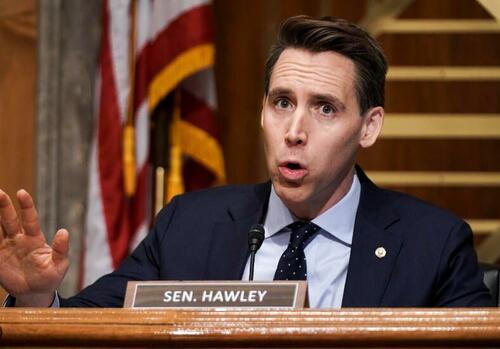CA Funding LGBTQ+ Group Fighting Parental Notification
Authored by Susan Crabtree via RealClear Wire,
Over the summer, when a Southern California school board opposed a new state-determined social studies curriculum that included a bio of slain gay rights activist Harvey Milk, Gov. Gavin Newsom issued a threatening tweet calling out the school board president by name.
“This isn’t Texas or Florida. In the Golden State, our kids have the freedom to learn,” Newsom tweeted. “Congrats Mr. Komrosky you have our attention. Stay tuned.”
Newsom followed up the vague warning with a far more tangible one. In a subsequent statement, the governor labeled the board’s reluctance to accept the curricula an act of “hate” and announced a $1.5 million fine for what he described as a “willful violation of the law.” He also threatened a lawsuit and a state Justice Department civil rights investigation.
“Demagogues who whitewash history, censor books, and perpetuate prejudice must never succeed,” Newsom added. “Hate doesn’t belong in our classrooms, and because of the board’s majority’s antics, Temecula has a civil rights investigation to answer for.”
Komrosky and other members of the school board for the Temecula Valley Unified School District were concerned about Milk’s well-documented relationship with a 16-year-old boy when he was in his 30s. He and other board members labeled Milk a “pedophile” and didn’t want his bio included in a supplemental curriculum for certain grade levels.
After Newsom’s threat of legal action, the school board began to waver. Komrosky called an emergency Friday meeting that stretched late into the night and partially backed down, agreeing to accept the textbooks but putting off a decision on the 4th-grade lessons on civil rights, including the gay rights movement, until the board and parents could review it further.
The confrontation spurred weeks of headlines, with members of the LGBTQ+ community praising the governor’s actions while parents’ rights groups bemoaned the top-down threats from the highest level of state government.
The Democrat-controlled state legislature last month passed a bill that would legalize hefty state fines for school boards that reject state-determined curricula and other state policies. The state attorney general also sued a different school district in Chino for requiring parents to be notified when their children begin identifying as a different gender in California public schools.
In mid-October, a judge sided, at least temporarily, with the state, and granted a preliminary injunction against the parent notification policy until he makes a final decision.
Over the last several months, the school board clashes have fueled a series of protests and rallies at the state Capitol in which parents, students, pastors, and school board members have accused the Newsom administration and the state legislature of keeping secrets from parents and undermining their ability to care for and oversee their children.
On the other side of the debate are Newsom, Attorney General Rob Bonta, state Superintendent of Public Instruction Tony Thurmond, and members of the LGBTQ+ community who argue that the school boards are trying to ban textbooks teaching diversity. They also assert that students in the state public elementary schools who are changing their gender have a right to privacy from their parents who could try to stop them from transitioning – or worse – use physical force as punishment for doing so.
Amid the furor on both sides of the school board controversies, in late August, Newsom announced the latest round of grants to support an effort to combat hate crimes against transgender, Muslim, and black people after the attorney general’s office found a 20% increase in such crimes across the state in 2022.
Among the taxpayer-funded grants is $630,000 to Equality California, an LGBTQ+ group fighting alongside Thurmond against school boards’ parental notification policies and their ability to object to diversity-oriented curricula.
Over the last four years, the state has provided $400 million in federal grants to fund security measures for faith-based organizations and other nonprofits, and $196 million in grants to local organizations focused on preventing hate crimes and supporting survivors. The funding is taking place as the state is running a $31.5 billion budget deficit, up from $22.5 billion projected in January.
The state recently awarded this year’s nearly $91.5 million in “Stop the Hate” grants to more than 170 community groups after at least two disturbing incidents that police say were motivated by anti-LGBTQ+ views and racism.
In August, a San Bernardino store owner was murdered after an argument over a rainbow “pride” flag hanging outside her store, and an Oakland elementary school was evacuated after receiving a bomb threat that police said was racially motivated.
Newsom last week also approved $10 million in funds to boost the presence of police at synagogues, mosques, and other places of worship as tensions have flared over the possibility of local violence stemming from the Israel-Hamas war.
Allowing all places of worship to receive the funds to boost security appears even-handed and proactive at a time of rising tensions and threat levels.
But the “Stop the Hate” grant to Equality California has sparked criticism from opponents that Newsom is inappropriately using state taxpayer funds to assist the top LBGTQ+ organization fighting parents over school board policies.
According to the California Department of Social Services, which issued the grants, the grants “may” fund various services and programs, including those providing mental health and legal services for victims and their families. The website also says funds could go to prevention services, including “arts and cultural work, youth development, senior safety and escort programs, safety planning, training and cross-racial alliance work.”
Equality California has been at the center of the fight for protecting children’s right to change genders without their parents’ knowledge in public schools across the state. The group has fiercely opposed the parental rights movement, labeling it homophobic and transphobic, and argues that notifying parents amounts to “forcibly outing” gender-transitioning children, which could lead to physical or emotional harm for these young people who already experience higher rates of depression, mental health, self-harm, and suicide than their peers.
Equality California staff have attended school board meetings and appeared alongside Thurmond as he answers questions from the press. The group’s staffers were among pro-LGBTQ+ advocates whom a Chino school board removed from a meeting along with Thurmond after he spoke against a proposed district policy that would require schools to inform parents if their students were changing their pronouns or asking to use different gendered facilities.
Because money is fungible, and the grant can help offset costs for the organization’s other work, parental rights advocates have argued that the grant is inappropriately boosting the group’s lobbying efforts opposing parental rights policies at local school boards.
According to its 2021 tax filings with the IRS, the most recent available, Equality California Institute spent more than $400,000 on lobbying the state legislature and received nearly $6 million in revenue for that year alone.
Carl DeMaio, a conservative radio talk show host in California who is gay, was the first to take issue with the Equality California grant in a post on his website, arguing that it was one of several designed to give a financial edge to left-leaning groups, such as Equality California, that actively engage in politics by endorsing candidates and other political activities.
For instance, the group endorsed Thurmond’s reelection last year, lauding him for “personally intervening” in a school board fight in Chino and working “diligently alongside Equality California to counter the attacks against our trans and gender-nonconforming youth, in particular, and we could not ask for a better ally and champion for all California students.” It’s unclear if that endorsement came directly from the Institute or another part of Equality California’s nonprofit organization.
“There’s nothing wrong with these far-left groups engaging in political advocacy. It’s their First Amendment right, but not with my tax dollars,” DeMaio told RealClearPolitics. “This is the oldest scam going on in California politics right now. It’s the utilization of taxpayer money to subsidize Democrat and left-wing political organizations.”
“If the National Rifle Association or the Cato Institute or the Heritage Foundation were receiving taxpayer money, the left and the media would be lighting their hair on fire, but here in California, you have political groups getting money from the government, and no one bats an eye,” he added.
Equality California spokesman Jorge Reyes Salinas says the Institute does not engage in political work, as DeMaio alleges, and stressed that the entire grant is devoted to supporting the state’s “Stop the Hate” program.
“Equality California Institute’s Stop the Hate program is a tool to ensure that LGBTQ+ Californians know about and have access to culturally responsive resources on hate crimes and bystander intervention,” he said in a statement to RCP. “Through outreach and partnerships, this program aims to advance education on how to curb the sharp increase in anti-LGBTQ hate crimes in California.”
Newsom’s office did not respond to RCP’s inquiries about the grant.
Lance Christensen, a former state legislative staffer who ran for California superintendent of schools as a Republican last year, now serves as the vice president of education policy and government at the conservative California Policy Center. The Center is one of the main groups backing the parental rights policies in school boards across the state.
Christensen argues that the deck is heavily stacked against his side because parents are already fighting the deep-pocketed teacher unions who back many of the policies parents’ rights groups have tried to fight, including extended COVID school shutdowns that kept students in virtual learning longer than many other states.
On top of that, the leaders of Equality California, which is more ideologically aligned with the Democrats who run the state, “feel like it’s their right and duty to extract money from taxpayers to help amplify their views,” he argued.
“The fact of the matter is, most parents are well aware of the positions these groups have,” he said. “They just aren’t aware that their tax dollars are going to subsidize these activities.”
Equality California has backed a raft of pro-LGBTQ+ bills that Newsom signed into law in late September, including several measures the governor’s office has said are designed to “better support vulnerable youth.” Among the new laws is one that would require courts to keep all petitions for a change of gender identity in public documents, including those filed by minors, confidential.
The group also strongly backed the Transgender, Gender-Diverse and Intersex Youth Empowerment Act, which would have required judges to consider whether parents have affirmed the gender identity of their children in custody disputes.
While Newsom said he shares the commitment to advance transgender rights, he vetoed that bill in mid-September, arguing that it would inappropriately change legal standards for another branch of government.
Susan Crabtree is RealClearPolitics’ White House/national political correspondent.
Tyler Durden
Tue, 10/31/2023 – 19:05
via ZeroHedge News https://ift.tt/r7gCzG4 Tyler Durden








